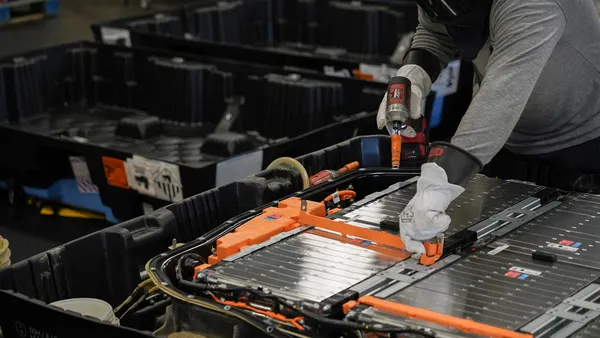Multiple states updated their waste, recycling and organics laws in the new year to improve recycling and organics systems and divert waste from disposal.
New laws regarding right-to-repair, organics management and recycling access are now on the books, and several more are expected to take effect by July.
What new laws are affecting your area this year? Let us know at waste.dive.editors@industrydive.com.
Oregon’s consumer right-to-repair law takes effect
Oregon enacted its new right-to-repair policy for consumer electronics on Jan. 1. The state now requires manufacturers of items like appliances, laptops and cell phones to provide replacement parts, service manuals and other resources to consumers and third-party repair businesses. The law also prohibits manufacturers from “parts pairing,” a practice of using software that prevents technicians from fully installing spare parts.
Supporters say the new law will help divert more electronics from disposal, which could also reduce fires caused by lithium-ion batteries in the waste stream. Organizations such as iFixit, the Association of Oregon Recyclers and the Oregon Refuse and Recycling Association supported the bill, which was signed by Gov. Tina Kotek in 2024.
More Washington businesses must now arrange for organics management
Certain businesses in Washington state with at least four cubic yards of weekly organic waste will now be required to arrange for collection services or manage it on site. It’s part of a broader state goal to reduce organic waste disposal 75% by 2030 and increase the volume of edible food recovery 20% by 2025.
Those that produce larger amounts have had to comply with the law since the beginning of 2024; businesses that generate a minimum of 96 gallons a week will face the same requirement in 2026.
Organics recycling requirements for businesses were set in 2022 when lawmakers approved HB 1799. Last year, the state also passed a related law that updated certain organics recycling requirements.
Other new laws of note:
- Large event recycling in Illinois: Certain facilities that host events with at least 3,500 attendees, such as some kinds of sports stadiums and convention centers, must now provide access to recycling and composting bins.
- Polystyrene foam packaging bans: Rhode Island and Oregon now have laws banning certain restaurants or food vendors from providing or serving food in containers made from polystyrene foam. Illinois’ existing ban now applies to smaller restaurants, not-for-profits, government agencies and other entities. A similar law in Delaware will take effect on July 1.
- Hotel single-use packaging bans: New York now prohibits certain hotels with 50 rooms or more from providing personal care products like soap or shampoo in small plastic containers or single-use packaging. Illinois has a similar law set to go into effect on July 1 for hotels with 50 rooms or more. Washington will follow suit for some kinds of hotels in 2027.
More laws taking effect in July:
- Oregon’s bottle bill will add canned wine. The measure, which applies only to wines sold in aluminum cans and not in glass bottles, takes effect July 1. The state’s bottle bill already covers aluminum beer cans.
- New Hampshire will enact a battery disposal ban. The waste industry-backed ban will prohibit the disposal of lithium-ion batteries as well as a range of other electronic devices starting July 1. This includes wireless telephones, printers, copiers, fax machines and a range of computer accessories. Operators of waste and recycling facilities will need to post information about the ban.
- Maine will update aspects of its bottle bill. Parts of the state’s bottle bill update law will go into effect in July. A new “commingling cooperative” of brand owners established in October will begin collecting deposits in July, among other tasks. The group is meant to collectively organize container collection as well as share cost and collection data with each other. Other planned changes include reworking funding for the program, easing sorting requirements for redemption centers, changing how unclaimed deposits are distributed and promoting reuse strategies.











